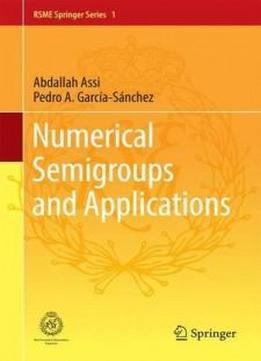
Numerical Semigroups And Applications (rsme Springer Series)
by Abdallah Assi /
2016 / English / PDF
1.7 MB Download
This work presents applications of numerical semigroups in
Algebraic Geometry, Number Theory, and Coding Theory. Background on
numerical semigroups is presented in the first two chapters, which
introduce basic notation and fundamental concepts and irreducible
numerical semigroups. The focus is in particular on free
semigroups, which are irreducible; semigroups associated with
planar curves are of this kind. The authors also introduce
semigroups associated with irreducible meromorphic series, and show
how these are used in order to present the properties of
planar curves. Invariants of non-unique factorizations for
numerical semigroups are also studied. These invariants are
computationally accessible in this setting, and thus this monograph
can be used as an introduction to Factorization Theory. Since
factorizations and divisibility are strongly connected, the authors
show some applications to AG Codes in the final section. The book
will be of value for undergraduate students (especially those at a
higher level) and also for researchers wishing to focus on the
state of art in numerical semigroups research.
This work presents applications of numerical semigroups in
Algebraic Geometry, Number Theory, and Coding Theory. Background on
numerical semigroups is presented in the first two chapters, which
introduce basic notation and fundamental concepts and irreducible
numerical semigroups. The focus is in particular on free
semigroups, which are irreducible; semigroups associated with
planar curves are of this kind. The authors also introduce
semigroups associated with irreducible meromorphic series, and show
how these are used in order to present the properties of
planar curves. Invariants of non-unique factorizations for
numerical semigroups are also studied. These invariants are
computationally accessible in this setting, and thus this monograph
can be used as an introduction to Factorization Theory. Since
factorizations and divisibility are strongly connected, the authors
show some applications to AG Codes in the final section. The book
will be of value for undergraduate students (especially those at a
higher level) and also for researchers wishing to focus on the
state of art in numerical semigroups research.











